
Think of beaches and it's likely you see parasols, sand, sunshine and Uncle Geoff refusing to wear a top, ultimately exposing his wondrous manboobs to all and sundry without a care in the world, as is his right. It could be worse. I once saw a man wearing a fluorescent green mankini on an urban beach in Prague. Try getting that mental image out of your head. I sure as hell can't.
Unfortunately, beaches the world over are becoming increasingly cluttered with rubbish, particularly plastic - and that's just a drop in the ocean when compared to, well, pollution in the ocean.
More to the point, Keep Britain Tidy's research shows that 80 percent of marine litter (in the UK at least) comes from the land, meaning that the bottle or fag-end you drop while having a drink and a smoke outside your nearest Ladbrokes may be the same one choking an albatross further down the line. Was 40/1 on a shock Premier League result really worth it?
Advert
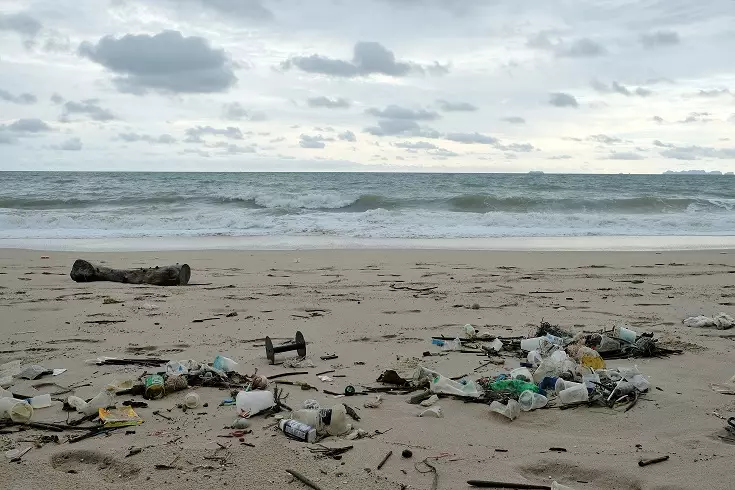
Plastic washes up on a beach in Thailand. Credit: PA
But there's littering to think of too. Much of what is discarded on our beaches ends up being washed into the sea and vice versa; many products which are flushed through our sewage system (such as wet wipes, and even rubber johnnies) can ultimately end up being washed back ashore. But most damagingly in the long term, harder plastics such as soft drinks bottles never really break down; they just become smaller until they are consumed by smaller sea creatures, ending up in the oceans and ultimately working their way back into our food chain.
Though there is no single reason for ocean and beach pollution, individuals play a huge part, as does big business. Sixty-two percent of people in England litter, but only 28 percent admit it - a telling statistic of people doing something they know they shouldn't - while community interest company City to Sea are note that flushed plastics comprise around seven percent of litter on UK beaches. Hence their handy rhyming slogan: 'only pee, paper and poo goes down the loo,' the latter being a semi-posh word for toilet, which is an old-fashioned way of saying the bog.
Advert
This means people are littering both passively (in cases where they don't realise that what they flush down the toilet contributes to the problem) and actively, throwing away rubbish instead of finding the nearest bin.
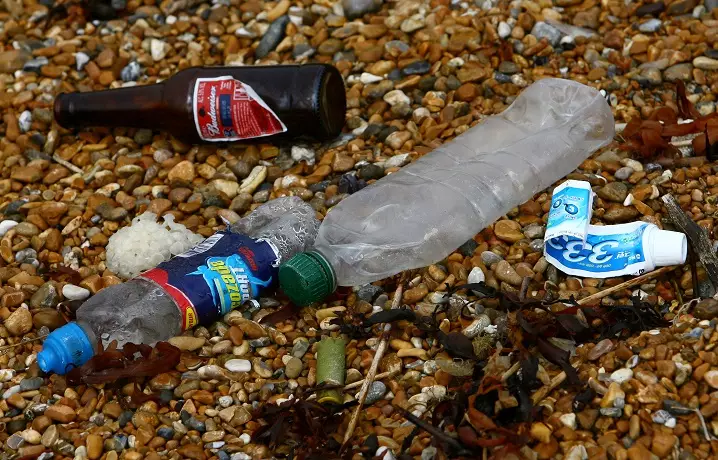
Litter on a beach in Dover, Kent. Credit: PA
A recent spate of bank holiday littering on Southend and Leigh beaches resulted in local residents blaming underage drinkers for the mess, the yoof seemingly drinking and discarding without a care in the world. However, while those pesky young gobshites were certainly to blame, the reality is that our use of plastics as a society has grown massively, with a report (2016) finding that littering on UK beaches has risen by up to a third.
Advert
Still, while young people aren't the only ones who need to hold their hands up, Keep Britain Tidy's 2016 soft drinks littering report, produced in partnership with Coco-Cola, shows they have a higher propensity to litter. There are various reasons for this too, ranging from a nebulous grasp of 'looking cool' to the failure of government awareness projects.
Going back to marine and beach pollution, and our increasing use of plastics, Lauren Eyles, MCS Beachwatch Manager told the Guardian: "There have been increases in the number of plastic bottles found on beaches in England, Scotland, Channel Islands, and Northern Ireland.
"The bottles we find on beaches are either dropped directly onto the beach, blown from land or sea, or ending up there via rivers. The more we use as a nation, the more we'll see ending up on our shores."
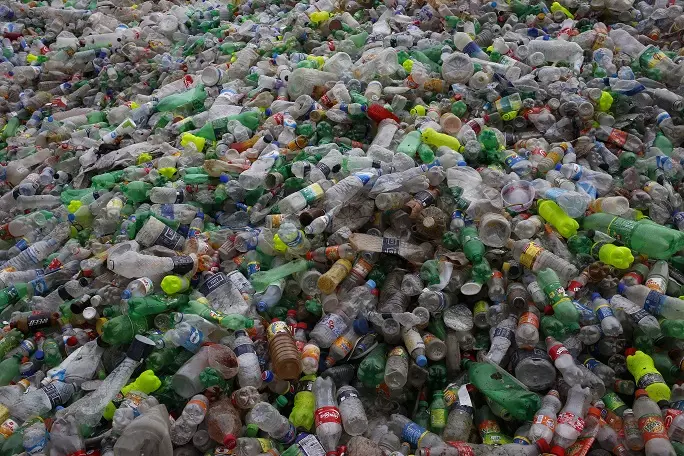
Advert
More and more plastic bottles are being found on beaches across the British Isles. Credit: PA
In a worldwide context, the outlook is grimmer still. Marcus Franck, founder of Franck Energy, a green start-up which helps homeowners and businesses switch to renewable energy and become more energy-efficient, gave LADbible some insight into the global scale of the problem.
"Nearly 13 million tonnes of plastic pollutes our oceans every year, according to Greenpeace," he said. "It accounts for around 90 percent of all sea pollution.
"A report by Imperial College London suggested that there could be as many as 50 trillion pieces of microplastic floating in the ocean. These are big numbers, and even the vastness of our oceans can't dilute the impact of plastic pollution on marine life, plants, and the global food chain."
Advert
While angry folk in local paper style stories:tm: may seem an over-the-top swipe at the youth-ting mandem, the truth is that today we have access to ever more plastic and are more likely to litter as a result - and on a global scale, the problem is stark.
According to research published by Eunomia, a whopping 94 percent (ok, that does sound big) of plastic that enters the ocean ends up covering the seafloor, while barely one percent is found near surface level. Naturally, this presents disastrous consequences for marine life.
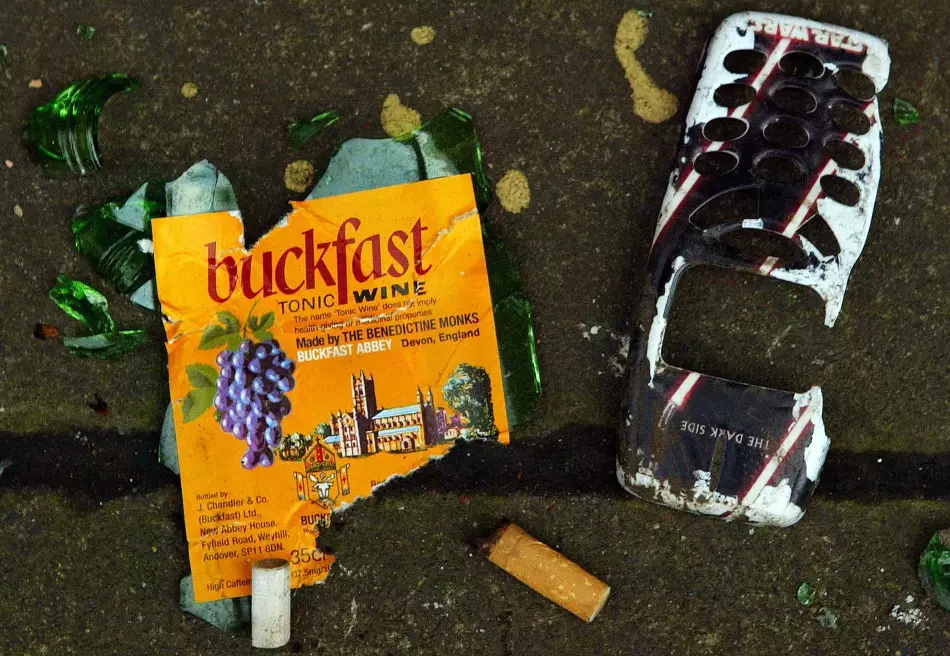
Litter on the streets of Bristo Square, Edinburgh. Credit: PA
Meanwhile, in the UK, Keep Britain Tidy's report found that over 30 million tonnes of litter are collected from the streets in England every year. That's enough to fill Wembley Stadium to the brim four times over, which is a bigger crowd than Spurs could ever hope to attract this season. With much of that ending up in landfill or finding its way into the seas, ocean pollution and littering are inextricably connected - like John Terry and Chelsea, but less awful.
Littering of all kinds is a huge problem, socially and environmentally, but when it comes to plastic, the material is the bastard de resistance, taking up to 500 years to break down once it's made its way into the sea, again posing up-shit-creek consequences for marine life, from fishies to coral.
Louisa Casson, oceans campaigner at Greenpeace UK, elaborated on the problems plastic pollution is causing our oceans.
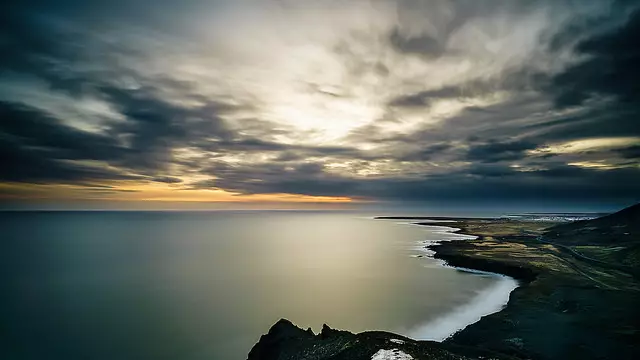
The Atlantic Ocean. Credit Hafsteinn Robertsson (Creative Commons)
"It wasn't that long ago that people used to think the oceans were so vast that we couldn't really impact them through human actions," she told LADbible. "With climate change, ocean acidification and plastic pollution, that's all changing.
"Every single minute, the equivalent of a rubbish truck of plastic is pouring into the seas globally... up to 12 million tonnes a year.
"And scientists don't even know how much is in there - estimates range from five trillion to 50 trillion tiny pieces of plastic."
She went on to discuss the culprits. "Big companies who produce loads of single-use plastics, especially the soft drinks industry which produces millions of tonnes of throwaway plastic bottles every year, are happy to let consumers take the blame. Take Coca-Cola: it produces over 100 billion single-use plastic bottles every year - and rather than moving towards reusable bottles or refillable systems, they're actually increasing the number of throwaway bottles they're making."
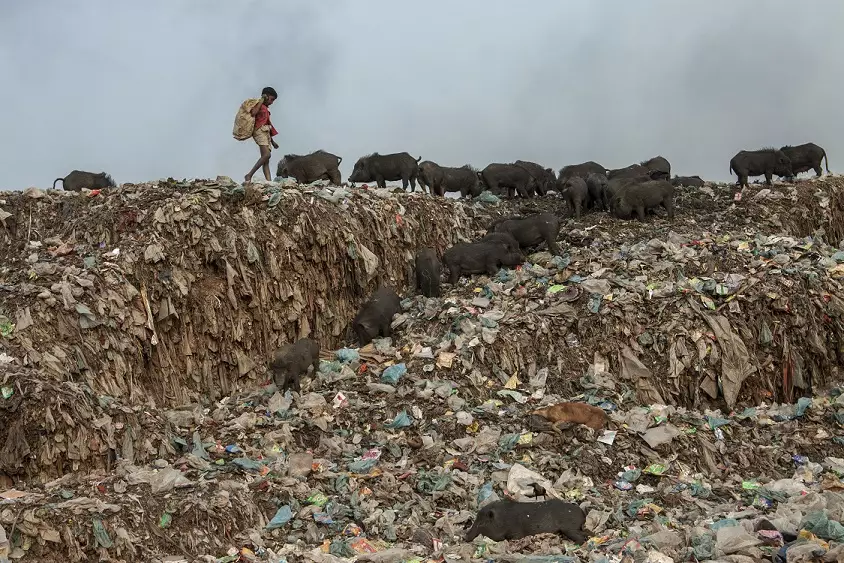
Mountains of plastic bags in Dhaka, Bangladesh. Credit: PA
While Casson emphasises that we should "all be disposing of plastic responsibly", she notes the importance of getting huge companies on board, summarising that "it makes no sense that something we use for five minutes should end up polluting the oceans for centuries."
There is some good news. Plastic bag pollution on UK beaches has fallen by nearly half since the 5p levy was introduced (and soon they could be on their way out permanently), and similar initiatives have been introduced in many countries around the world; though in some countries, such as China and India, success has been limited.
So while the causes of increased beach and sea pollution are multiple, and the answers more complex than Inception (though not as overrated), it's evident that vast changes with regards to our attitudes (individually, nationally and at company level) towards plastics use are required. And yet they're necessary to ensure our beaches are cleaner, our waters clearer, and our Uncle Geoffs freerer to frollick in the brief summer sun without having to worry about the seas and sand disappearing in a synthetic, non-degradable haze.
Words: Ronan O'Shea
***
LADbible has claimed the world's first country made entirely of trash to highlight the issue of plastic pollution in our oceans.
Get involved and ensure the world's first country made of trash is its last.
Become a citizen of the Trash Isles here
Donate to our charity partner, Plastic Oceans Foundation here
Topics: Pollution, trashisles